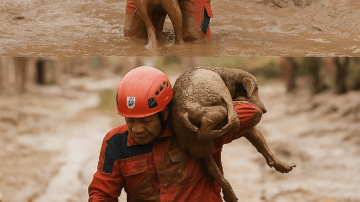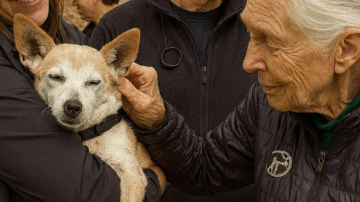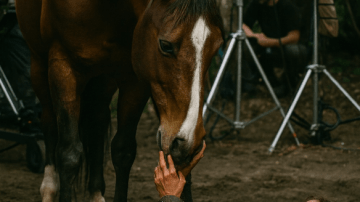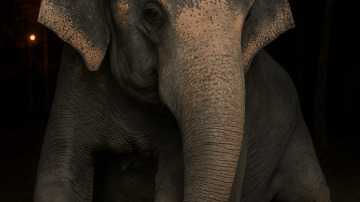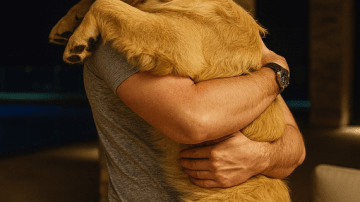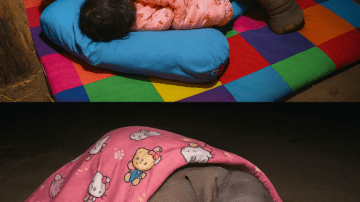The first time we met Kama, she was lying still, her body wrapped in pain, her spirit teetering between life and death.

Kama was a mother who had done the unthinkable: she had hurled herself into the flames to save her babies. Her muzzle, her paws, her belly, her groin—even her eyes—were scorched by fire. Every breath she drew was agony, every blink a reminder of the inferno she had braved. She had fought alone for weeks, determined to live long enough to protect her pups. But her strength could carry her only so far. When her body finally gave out, she collapsed. That was when she was rushed to us in Moscow.
She wasn’t just burned—she was broken. Exhausted. A shell of herself. Yet beneath the pain, there was still something fierce, something unwilling to surrender. That night, as the city went to sleep, we began our fight for her survival.
Her first treatment lasted two and a half hours. Surgeons worked with almost impossible precision, cutting away the dead tissue piece by piece, every second a race against time. When it was finally done, her body was swaddled in bandages, from head to paw, like a fragile treasure we could not afford to lose. To keep her alive, she was given an albumin transfusion, and doctors whispered about blood donors for the following day. Her condition was “stable,” they said—but in truth, she was balancing on the narrowest edge of life.
Around the clock, she was sedated, her pain carefully managed. Even so, her body betrayed her: her claws fell off one by one, her paws and belly blackened by burns. Her limbs could no longer bend. If she lived, months of surgery and rehabilitation would wait. Her eyes, clouded by the fire, seemed almost blind. And yet, through ointments, drops, and hope, she still managed to see—faint shapes, a trace of movement, and most importantly, the hands that offered her kindness.

Then came the first miracle. One day, she ate on her own. Just a bite. Just a fraction of what she needed. But it was everything. For the first time, we saw her not as a victim, but as a fighter. She was choosing life.
Slowly, she dared to shift positions. Instead of lying helplessly on her side, she rolled onto her belly. That small act felt like victory. She even found mischief within her pain, chewing through her catheters not once, but twice. Even burned and broken, Kama had spirit.
Fifteen long days she stayed in intensive care. Each moment was drenched in suffering, yet she endured. Finally, the day came when she was strong enough to leave the ward. Her appetite returned, her will to rise became visible again. But behind her fragile recovery was a sorrow that words could not touch. She had walked into the fire for her babies. And lost them all.

Her days settled into a routine of treatments under sedation, endless exams, dressing changes. It was exhausting, but necessary. With time, her body began to heal. Her muzzle softened, her eyes grew less clouded, and her steps—though halting—were more confident. Rehabilitation began.
But her battle wasn’t over. The scars had stiffened her joints. Her hips were frozen, her kneecaps dislocated, and her right elbow remained the worst of all. Every step was painful. Every stretch was a test of endurance. Yet she accepted the creams, the exercises, the slow agony of rehabilitation. Day by day, she limped forward. And though her eyes still held sadness, they began to glow faintly with hope.
What she wanted most was not medicine, not food—it was love. A gentle hand resting on her head. A body to lean against. In those moments, when she nestled into us, we understood: she did not just want to survive. She wanted to live.
The hospital staff adored her. She wasn’t just another patient anymore. She was an inspiration.
And then, the day of release came. Kama, who had walked through fire, endured months of torment, and fought back against death itself, was finally free to leave the clinic. My heart felt as if it might burst with relief.
Kama came home with me. She was still fragile, still scarred, her steps uncertain, her body forever changed. But in my home, she was not a patient—she was family. I made her a bed with soft blankets. I fed her by hand when she couldn’t manage alone. I stayed with her through the long nights when the pain returned and would not let her sleep.

And then, little by little, she began to change. She no longer trembled at every sound. She wagged her tail when I entered the room. She discovered the comfort of a couch, the joy of short walks, the safety of curling up beside someone who would never leave her.
One evening, she looked at me with eyes no longer clouded by sorrow, and she smiled. A dog’s smile—pure, unguarded, the kind that only comes when they feel safe.
Those months of foster care were more than healing. They were a bridge from tragedy to hope. She learned to trust again, to love again, to believe that life could still be beautiful.
And then, the moment arrived. The perfect family appeared. I knew in my heart that she was ready. Letting her go was the hardest thing I’ve ever done—but also the most beautiful. Because Kama deserved more than survival. She deserved forever.
Her new family gave her a new name: Dudu. A name for a new life, a new beginning. She walked softly through her new home, curled on a soft pillow, ate gently from her new mother’s hand. She learned to play with cats, to love children, to walk long distances, to cuddle without fear. Each step was filled with grace, each glance with trust.
She had survived fire. She had survived sepsis. She had learned to walk without claws, to see through scarred eyes, to accept love again.
And now, she was no longer just a survivor. She was family. She was home. She was loved. Forever.

